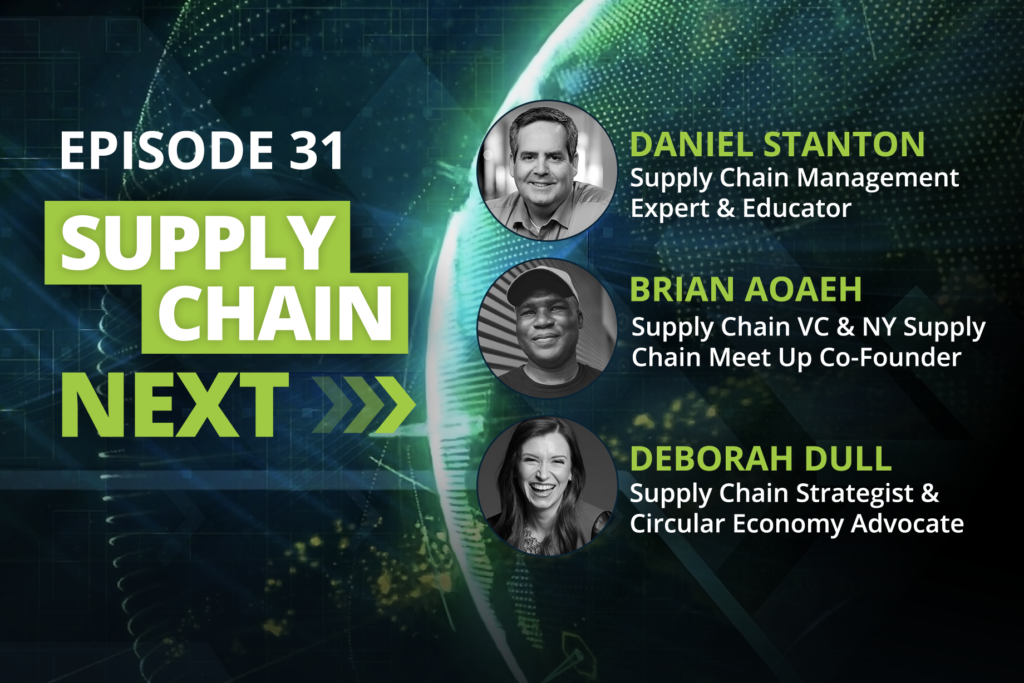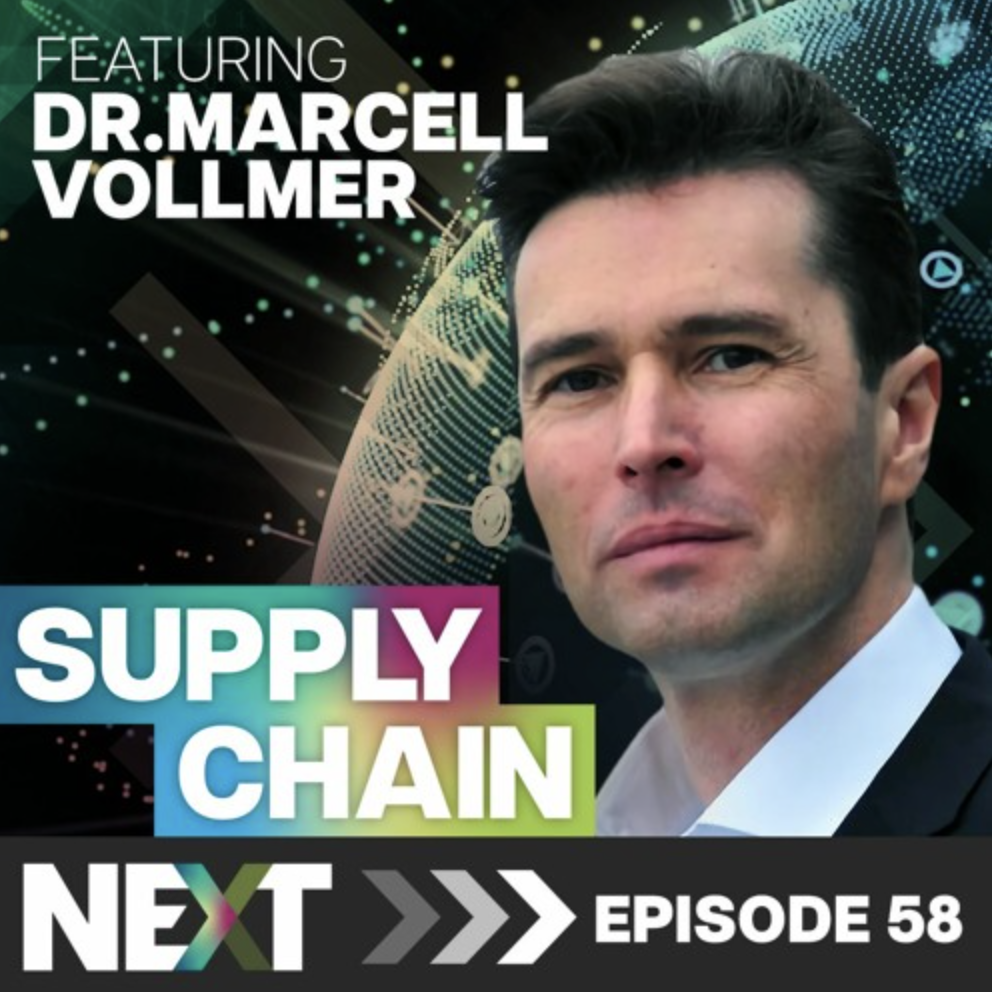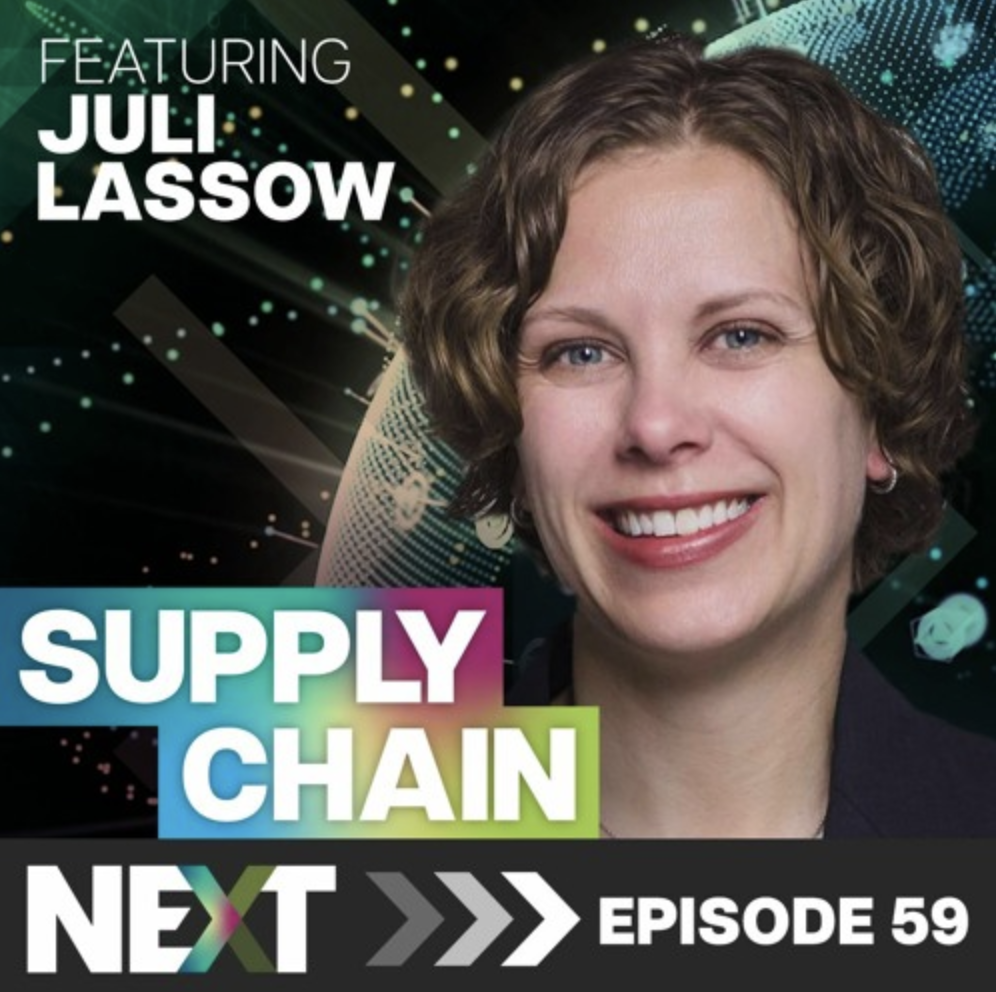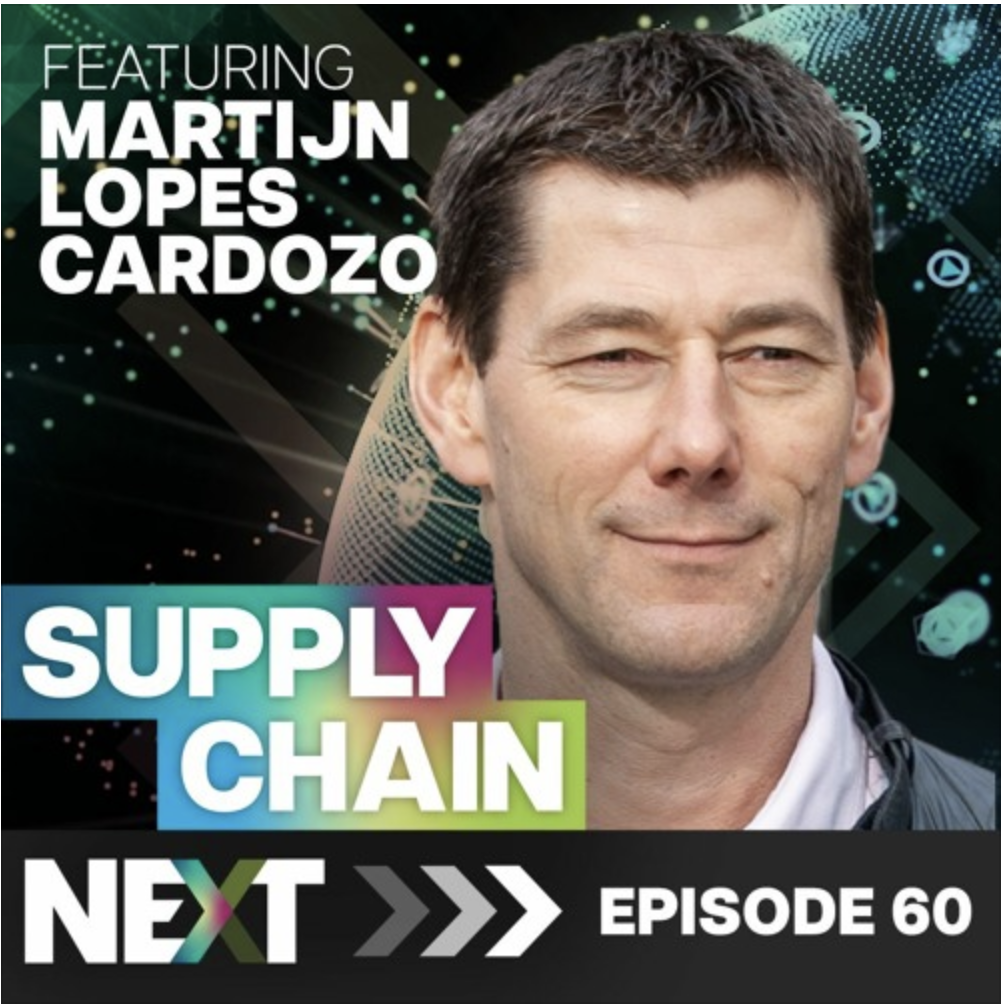EPISODE 31
Podcast: All-Star Panel on International Supply Chain Day
The push for an International Supply Chain day has begun! Join Richard Donaldson and his guests in this highly engaging discussion about how this day of awareness could take shape, and how it could help supply chain practitioners, enterprises, and the planet.
Deborah Dull is a circular supply chain expert focused on inventory management. She is a principal of manufacturing product management for GE Digital and founder of the Circular Supply Chain Network. Her mission is to help the enterprises of the world enter circularity in an effort to preserve our environment.
Brian Aoaeh is a venture capitalist who is out to bring much-needed innovation to the world of supply chain. He co-founded REFASHIOND Ventures and The Worldwide Supply Chain Federation with business partner Lisa Morales-Hellebo to help supply chain technology startups bring their innovative ideas to life.
Daniel Stanton, also known as “Mr. Supply Chain” is a consultant and educator. He is the author of Supply Chain Management for Dummies, now considered an industry standard textbook for both new and experienced supply chain professionals.
On episode 31 of Supply Chain Next, Richard Donaldson opens the discussion by asking what an International Supply Chain day could mean for global productivity, our environment, and the younger generation’s career choices.
Listen to the podcast below or watch the video version on YouTube.

Highlights from the Conversation
Welcome everybody! Let’s jump right in. The point of this discussion is to see if we can find a day dedicated to our industry: an International Supply Chain Day.
Everybody here brings a different perspective to this subject. You all have experience in the industry that spans the globe.
Does our industry need this and how can we get this done?
Daniel Stanton:
- Before any of us get to work on this Richard, answer this: why do you think an International Supply Chain day is a good idea? What would the goal be? What are we trying to accomplish?
Careful what you wish for Daniel!
For me, when I look around, I can see all of this supply chain momentum. We are now in the decade of supply chain. Supply chain was top of mind prior to the pandemic and has become even more since the pandemic hit.
Everyone is talking about supply chain innovation, digitalization, circularity, and sustainability, but I’ve yet to see how all of this is grounded in something that is tangible.
I thought, “What if there was a day that could highlight the world’s supply chain?”
Out of the 7.6 billion people in the world, every single person in the world is a part of the global supply chain, whether they are a consumer or producer.
Social responsibility can extend into the world of supply chain so why not get a day up and running where people can learn more about how we are all connected?
International Supply Chain Day could be an annual check-in where we measure our progress as a planet in our goals of improving the one thing that truly connects us all: the supply chains of the world.
For example, if the total world supply chains could reach 60% circularity that would have a tremendous impact on our planet’s sustainability.
Brian Aoaeh:
- It’s much more than just a “decade of supply chain” Richard! I think that we are entering into a golden age of supply chain. Over the next century all of the action will be in supply chain.
- We’ve spoken of this before: the world is a supply chain whether you think of natural supply chains or man-made supply chains. The past, present, and future have been, are, and will be, built on supply chains.
- It turns out that between the years 1975 and 2050 there are going to be more people living in the world than have existed throughout the entirety of human history.
- So now we start to think about the pressure this puts on the limited resources of the world. And then you start to understand the whole process of building and running supply chains.
Deborah Dull:
- I’m going to play off of what Brian said. We have a saying concerning the circularity within supply chain: everything is inventory. If you look around you right now everything is feedstock for the future.
- Up until this point supply chain professionals have sprinted down the runway towards “point of sale” and washed our hands of everything else.
- Tomorrow will be a rebuilding of our relationships with our customers and we’ll be doing more repairing than creating new products.
- Supply chain professionals like to get together and nerd out on supply chain… perhaps the International Supply Chain day could exist so we can relish in our nerdiness?
- We are trying to get circularity into the mainstream.
- About 37% of the population in the United States works in supply chain. The rest, most likely, don’t much consider the supply chains required to send and receive the products in their lives.
- And now I’ll hand it over to “Mr. Supply Chain” himself!
Daniel Stanton:
- We talk about supply chains as if they are linear when in fact they are a network. And it’s not just about supply, it’s also about demand.
- We’re trying to move toward circularity.
- How did we get to calling it a “supply chain”?
- I think this is what you’re trying to do Richard: the International Supply Chain day is about raising awareness.
- We need everybody to understand supply chain because we’re all a part of it. We all need supply chain, are dependant on supply chain, and contribute to the supply chain.
- Supply chain is a way to look at our world and the companies within it and when you adopt this view you are able to make changes.
- We need to start with a goal. The goal for doing an International Supply Chain day, or week, or month, or decade, or century… is to raise awareness of the supply chains of our planet so people can understand their importance and their role within our civilization.
- This will also help to reach young people before they start the journey to choosing a career. We’d like to get them to consider a career path in supply chain. This can guide them in their school program choices and beyond.
- When the younger generation gets involved they can seriously help guide the future of supply chain into circularity and greater unity.
Okay, so we’re agreed on increasing awareness.
Now we should address transparency. The one thing that I hear most from supply chain people is the need for increased transparency. What does transparency mean for everybody here today?
Daniel Stanton:
- I’m going to jump in on that. When you say “transparency”, what do you mean?
- For me there’s a difference between transparency and visibility. Visibility is being able to see within your own supply chain. And folks are talking about that a lot right now because of 2020 and 2021.
- Transparency is when other people can see what’s happening within your supply chain.
If we look at the National Geographic infographic that shows transparency around the amount of resources that are mined out of the earth, that’s transparency.
When you see the 107 gigatons of stuff that’s consumed on an annual basis, it’s shocking to see that only a few dozen minerals make up pretty much everything that is made.
If we’re at about 7% circularity now, how do we get that up to 50% circularity? And how do we provide transparency without letting companies give up their competitive advantage?
Daniel Stanton:
- That’s just it. What’s the incentive for a company to voluntarily give up data that could erode their competitive advantage?
Deborah Dull:
- It doesn’t have to be “human transparent”, only transparent. I think we have a chance to be responsible with how we share data.
- The generations of spenders coming into the economy have different expectations than previous generations.
- We should be using transparency and visibility to support our decision making processes as more consumers enter the market who actually care how and where their products are made.
- We’re going to end up with companies who will be glad to share their data and others who want to hide their data.
- How do we match a digital companion to each and every item that shows where it has been and what energy source was used to make it? Is there a way to do this that conceals the ingredients of the product?
- This way companies can still innovate and hold some level of intellectual property protection.
- We have the technology to do this but it makes everybody nervous.
Daniel Stanton:
- And it’s expensive to implement transparency. Who will pay for it?
It is expensive… unless Brian invests in the companies and figures out how to do this stuff and get these ideas into the public sphere.
Brian Aoaeh:
- The technologies that make these sorts of things possible are getting much more advanced by the day and their costs are going down so there’s no reason for these ideas to remain on hold in the future.
- If I think about the United Nations sustainability goals, they all boil down to rethinking supply chains.
- In my experience with talking to investors, many of them are really excited about tackling climate change and there’s a lot of money going into technology used to heal global warming. I tell them that humans are responsible for climate change and that this is coming from the supply chains.
- If we’re going to get a hold on climate change we need to take a hard look at supply chain innovation.
Climate change is an outcome of mismanaged supply chains.
7.6 billion people are doing something everyday to exchange stuff whether it’s mined, produced, consumed, traded, transported… and it has a cascading effect. If you go 50% circular you will drop much of the need to meet current sustainability goals.
The International Supply Chain day will help to bring awareness which can contribute to a rearrangement of the current state of the world’s supply chains.
Another term I keep hearing about is resiliency. Is resiliency as important as the trends indicate?
Daniel Stanton:
- Risk and resilience are very much related. In general we look at risk as uncertainty around the supply chain and we view resilience as a quality of the supply chain. In this sense they are two sides of the same coin.
- I’m glad you brought that in because we jumped right into sustainability, which is something that we all have strong feelings about… but the truth is that sustainability isn’t the definition of supply chain, it’s an aspect of supply chain just like risk, resilience, efficiency, and variety… if we view supply chain as a whole we can tackle each of these aspects as needed.
- At the end of the day supply chains are how we produce and deliver things of value. This is what we should focus on.
Deborah Dull:
- The mismanagement of supply chains… we’ve made choices these last 100 years to sell trash to consumers. The question is: how many moments in a product’s life pass before it is considered trash? Is it a minute, an hour, a year, or ten years? This planned obsolescence is what today’s economy is built on.
- I don’t want to knock it too hard though, because 100 years ago life was pretty harsh and now it’s pretty awesome. We’re healthier, we have more rights, we have more equity, we have the ability to work our way up Maslow’s hierarchy of needs.
- We have reaped many benefits from this type of economic model.
- We’re not a lost cause. Many materials are recycled currently and this number is growing.
- We’ve created a system that was never going to last forever. We can change the bad decisions of the past and move forward with better practices.
- We have figured out how to do supply chain well and that will be our foundation going forward.
What do we want our global supply chain to be focused on in addition to sustainability, transparency, and visibility?
What does resiliency mean in the context of advancing supply chain practices?
Deborah Dull:
- Resiliency means that those things you were looking for at the store which were out of stock wouldn’t have been out of stock.
- People are shocked when they discover that their products, and the materials that make them, have traveled thousands of miles in their journey to get to them.
- Our supply chains are really long and this opens them up to disruption opportunities. Long supply chains are also susceptible to risk and resiliency issues.
- If we can shorten the supply chains we can reduce risk.
- We can continue the trend of installing local supply chains (locally produced items) and still tackle the problem of improving the global supply chains.
- We could have lived differently over these last 100 years but the amount of economic growth that we have achieved may not have happened.
- The ability to order a coffee through an app and then visit the cafe to pick it up is really impressive to me as a supply chain professional. If we can use this as an example to illustrate the value of our interconnectedness to people who don’t work in supply chain we’d be closer to our goals.
- We need to make supply chains simple so everybody can understand them. Then we can get them onboard to demanding simpler, more local and regional supply chains, which will have a positive impact on sustainability and circularity.
- Many consumers do care and want to know where the products that they buy come from and if they were made unethically or not.
Brian Aoaeh:
- We want to invest in innovation. However, there are many things that are working very well in supply chain and those things shouldn’t be changed. There is no need to reinvent the wheel in many cases.
- Our job is to figure out what isn’t working right and then put our effort and investments into those areas.
- We want to get these innovators’ ideas implemented.
- There’s a documentary series on BBC called Follow the Food. The other day I was watching it and the narrator said that in the next 30 years humanity will have to produce more food than it ever has in the entirety of our history to feed the world.
- It’s a mind blowing thought but it opens up the opportunity for innovation to really lead the way and I’m excited about this.
We’re adding about 155 million births per year and we average about 55 million deaths per year. So we’re adding about 100 million new souls to this planet per year.
When we have 14 billion people in 20 or 30 years, this will really push supply chain issues to the forefront.
Imagine a pandemic that hits a world that’s two or three times larger than it is now.
Deborah Dull:
- 30 years from now 80% of that population will live in cities.
- If we try to imagine the food production in that time it won’t be in fields, it’s going to be underground and vertical.
- They’ll be growing it underneath the buildings they live in.
- That is happening already. The innovation that’s occurring in space research is contributing to this. We need supply chain professionals invited to the party since our expertise can greatly help in these endeavors. All we do in life is identify system constraints.
Daniel Stanton:
- We need to go back and make connections to the people who are working in supply chain. The innovations being made don’t do much until supply chain people can implement these innovations.
- How do we get the innovators to realize that supply chain professionals are the key to bringing their solutions to the real world? This could be another advantage to an International Supply Chain Day.
- This day could be a great opportunity for everybody to connect and consider the solutions we need going forward.
Brian Aoaeh:
- This is exactly what led to the formation of The Worldwide Supply Chain Federation. People who know technology are often lacking the supply chain knowledge required to put their innovations to work in the real world.
- We need to create a bridge between the innovators and technologists and supply chain professionals.
In the future we’re going to have a solar system based supply chain. If we look at SpaceX started by Elon Musk, that’s not a rocket company, that’s a supply chain company.
Daniel Stanton:
- Who are their United States based competitors? Amazon. I think all of us here have seen Amazon as a supply chain company for a long time even though they didn’t want to admit it at first.
- If we add spaceships into the mix, that wouldn’t be a problem for Amazon…
This type of day allows people to expand their views on our world and what it takes to keep it running.
Hey, and if people still aren’t interested let’s throw space into the mix! How about a supply chain connected to extraterrestrials…?
Brian Aoaeh:
- There’s a phenomenon I’ve noticed among my friends. All I talk about with my friends is supply chain. At first they brush it off, but slowly, as they learn more, their concern rises at the supply chain problems around us.
Is there a competitor to our International Supply Chain day proposal? Is there anything else out there like this?
Who can we bring in to make this happen?
Daniel Stanton:
- There have been lots of efforts along these lines to get a supply chain recognition day and I will separate those into three categories:
- Supply chain associations who try to start up a day dedicated to supply chain before it quickly fizzles out.
- Companies who want a supply chain day but end up really only “celebrating themselves” which has little value to others.
- Universities who usually put the day into place to promote a major in supply chain for recruiting events.
To be honest none of these efforts ever get anywhere but it does indicate that there is some interest in getting something like this going. - How do we avoid the lack of success that these attempts have encountered? How do we make this relevant to all associations, companies, and universities?
- A great place to start would be a consortium of influential supply chain universities. This would take time.
- This may lead to supply chain companies coming onboard.
- The alumni of these universities who are already out and working in supply chain would be great allies too.
- We need to drive collaboration instead of competition.
There’s no playbook for this and getting people onboard and keeping everybody’s enthusiasm in the right place is certainly a challenge.
Deborah Dull:
- Let’s say that Daniel’s idea is the way to go (a collaboration between many universities across the world). This would be a great place to start, especially now with the technology that we have in place. You could meet supply chain people from all over the world and we could begin problem solving together very quickly.
- There are many ways we could implement this including how-to sessions, presentations, and problem solving sessions.
- Then we could start reaching younger people in elementary school and high school. This would give them a chance to learn about supply chain, work on problems within supply chain, and then share those problems with others around the world.
Daniel Stanton:
- I love the idea of a Shark Tank format for the meetings.
The takeaway in all of this is that there is both enthusiasm and skepticism for an International Supply Chain Day.
And that there are themes built around this too: sustainability, circularity, transparency, visibility, resiliency and risk…
Perhaps we can open up this discussion to the masses?
It was so great to have this discussion with you all. Thanks so much!
Connect with Our Guests
Deborah Dull, Brian Aoaeh, and Daniel Stanton are ready to connect on LinkedIn.
More Episodes
You can listen to our audio tracks and read highlights for each episode below.
We’ve also started publishing video episodes on our YouTube channel.
058 – Dr Marcell Vollmer – Tech in Supply Chain, and the Sustainability Shift
Supply Chain Next · 058 – Dr Marcell Vollmer – Tech in Supply Chain, and the Sustainability Shift Meet Dr. Marcell Vollmer Dr. Marcell Vollmer, a renowned expert in the fields of digitalization, innovation, and sustainability. Marcell is a sought-after speaker and author that has dedicated his career to helping companies and individuals navigate the rapidly…
059 – Juli Lassow – Revolutionizing Retail, Sustainable Strategies, & the Future of Partnerships
Supply Chain Next · 059 – Juli Lassow – Revolutionizing Retail, Sustainable Strategies, & the Future of Partnerships Juli Lassow ,founder of JHL Solutions Meet Juli Lassow Juli Lassow, an accomplished retail professional, speaker, writer, and sustainability advocate, is the founder of JHL Solutions, a consultancy focused on creating outstanding private-label partnerships. With a deep…
060 – Martijn Lopes Cardozo – Circular Supply Chain
Supply Chain Next · 060 – Martijn Lopes Cardozo – Circular Supply Chain Martijn Lopes Cardozo, CEO at Circle Economy Meet Martijn Lopes Cardozo Martijn, a seasoned entrepreneur, has an impressive track record of establishing prosperous ventures within the realms of software, mobile, and digital media in California. Upon returning to the Netherlands, he…



